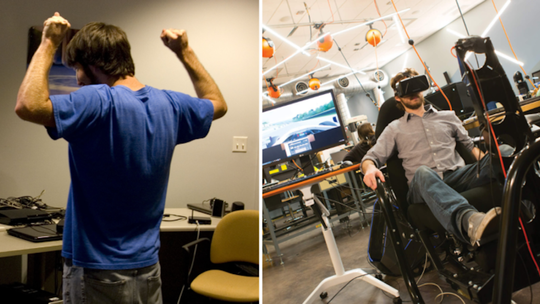
The Orlando region’s colleges and universities are serving as the pipeline for tech workers who are hard at work creating the metaverse.
The area is home to seven higher-education institutions offering undergraduate and graduate programs and research focused exclusively on simulation and interactivity with the metaverse. All are playing vital roles in cementing Orlando's status as the “MetaCenter” of the metaverse.
The University of Central Florida (UCF) and Full Sail University are just six miles apart but at the center of metaverse innovations, connecting academia and corporate collaboration with the latest in AR/VR, IoT, blockchain, Web3, gaming and entertainment. The DAVE School, Embry Riddle Aeronautical University, Orange Technical College, Seminole State College and Valencia College all offer similar programs.
UCF’s Florida Interactive Entertainment Academy’s (FIEA) offers the nation’s top-ranked master of science in interactive entertainment degree program. About half of FIEA graduates will go onto work for Electronic Arts, Iron Galaxy and other gaming or simulation companies in Orlando.
Central Florida also is a world hub for modeling and simulation. The U.S. Army, Navy, Air Force and Marines operate technology and procurement agencies focused on simulation and training at the Central Florida Research Park, and partner with UCF’s School of Modeling, Simulation and Training and the National Center for Simulation in a program called Team Orlando. Over $6 billion per year of contracts in simulation and training are awarded to commercial companies through Team Orlando.
With strong industry and educational institution growth, students are set up for success after graduation to bring significant impact to a growing list of major tech companies that call Orlando home.
Building the digital universe for the future
With more than 18,000 degrees awarded annually, UCF supports one of the nation’s largest talent pipelines, fueling the next generation of tech talent in Florida and beyond.
The university boasts a large concentration of AR/VR faculty and researchers from around the country, including Carolina Cruz-Neira, Ph.D., a pioneer of immersive virtual reality in UCF’s Department of Computer Science.
Cruz-Neira is working with nearly every college across the university to create a campus-wide digital twin initiative. She and her team are gathering data and creating the necessary real-time programming elements for a digital twin that will eventually include spaces for therapy, ways to teach surgery, and energy and defense applications.
The university also received $8.8 million through the federal Build Back Better regional challenge to develop a digital replica of the Center for Neovation, a world-class sensor and research development facility in Osceola County.
“At UCF, we are collaborating with our Research Park partners as well as companies across the region to solve challenges,” said Cruz-Neira. “We are building a digital universe from scratch. Our students are leaving UCF with a deep understanding of the technical aspects necessary to build digital experiences.”
UCF College of Health Professions and Sciences students are honing their skills in the new immersive, mixed-reality Blended Learning Interactive Simulation Suite (BLISS), which uses 270-degree, floor-to-ceiling touchscreen walls that display video and audio simulating any medical procedure or setting, from a hospital room to a football stadium.
Bringing AR/VR/IoT to the corporate world
At Full Sail University, emerging tech degrees span across artificial intelligence, IT, and cybersecurity, to simulation and visualization, user experience, nationally ranked gaming programs and beyond. Labs are filled with virtual reality headsets, smart equipment and 3D printers.
Through a partnership with AdventHealth University, Full Sail students and graduates created award-winning virtual training proof of concepts including a nurse IV trainer and the DaVinci Xi surgical robot trainer. This allows students and medical professionals to virtually practice a wide range of surgical procedures through a cost-effective, virtual alternative.
In addition, Full Sail’s simulation and visualization students have also 3-D printed a life-sized replica of Red Bull Racing’s RB16 Formula 1 race car and simulation experience, including haptics and screens. The experience of students creating their own simulations from the ground up has applications in defense, entertainment, gaming, health care, fitness and more.
“The intersection of the metaverse and the real world allows us to solve unique challenges. When companies come to us with a problem, we answer with technologies that do not exist. We innovate and create new technologies,” said Haifa Maamar, Ph.D., director of emerging technologies at Full Sail University. “Our students are inventing practical applications for the metaverse from day one. We are designing NFTs and looking ahead to how blockchain technologies can better serve the public.”
To learn more about the MetaCenter, please visit themetacenter.org.